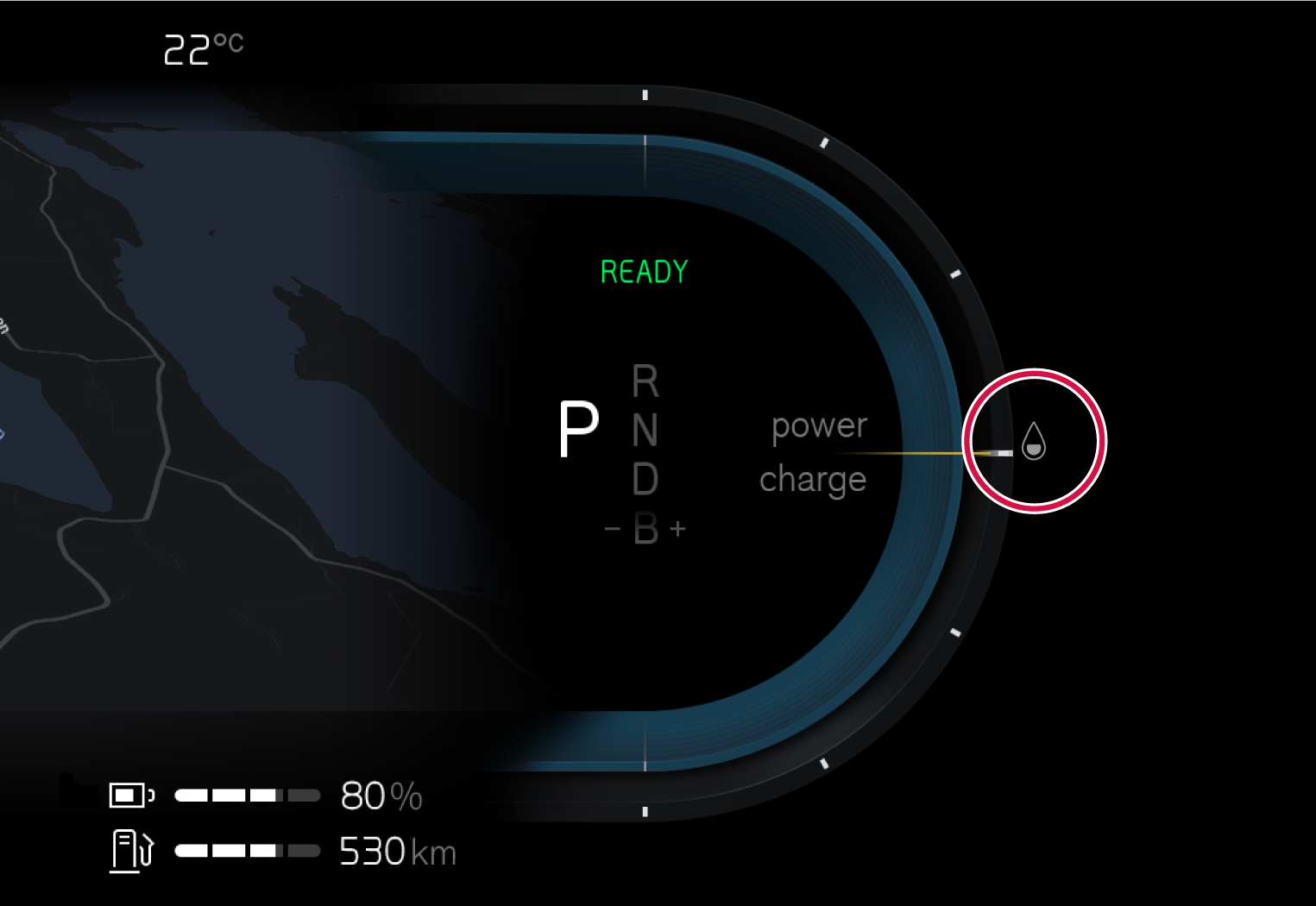Drive modes
Selectable drive modes
Four drive modes can be selected: Hybrid, Pure, Power1 and Constant AWD*.
The different drive modes are adapted to provide as good driving characteristics as possible in terms of the following:
- steering
- engine/gearbox/all-wheel drive
- brakes
- shock absorption
- driver display
- climate settings.
Warning
Indication in the driver display

The driver display indicates the drive mode selected.
Hybrid
When the car starts, it is in the Hybrid mode. The electric motor and internal combustion engine are used, individually or in parallel, and their use is adapted with regard to performance, fuel consumption and comfort. The capacity to run solely with the electric motor depends on the hybrid battery's energy level and, for example, the need for heating or cooling in the passenger compartment. The internal combustion engine starts when the car's power output exceeds the hybrid battery's capacity. In Hybrid mode the capacity is adjusted, based on the hybrid battery's charge level, the car's speed, etc.
Volvo recommends that you use the Hybrid mode for day-to-day driving.
Points to remember when driving with the Hybrid mode
- all-wheel drive is engaged automatically when required
- the internal combustion engine is started more often at low State of Charge (SoC) in the hybrid battery. Charge the car or activate Charge under Battery usage in the centre display to run on electricity alone.
- the car can be run on electricity alone at high State of Charge (SoC). The internal combustion engine starts when the energy level in the battery is insufficient for the engine power that the driver requests with the accelerator pedal.
- energy is regenerated back to the hybrid battery during gentle pressure on the brake pedal.
Pure
Use of the car's electric motor is prioritised in the Pure mode. The drive mode is available when the hybrid battery has a sufficiently high charge level. If the battery's charge level is too low, the car's characteristics are controlled in order to provide as low energy consumption as possible.
Volvo recommends that you use the Pure mode for day-to-day driving.
Points to remember when driving with the Pure mode
- the output of some climate settings is adapted
- in slippery road conditions, slightly more wheel-spin may be permitted before all-wheel drive is engaged
The Pure mode is available when the hybrid battery has a sufficiently high State of Charge (SoC) and power output, which may be affected by temperature. When the internal combustion engine starts, the drive mode automatically changes to the Hybrid mode until the driver has the opportunity to select the Pure mode again.
- if the battery's State of Charge (SoC) is too low
- if the driver fully depresses the accelerator pedal.
- if the battery's State of Charge (SoC) is too low
- if the speed exceeds 140 km/h(87 mph) (does not apply when driving downhill, etc.)
- in the event of system/component limitations e.g. low outside temperature.
Note
Note
Warning
Power3
The Power drive mode adapts the combined power output from the electric motor and internal combustion engine in order to provide as high as possible performance and response to acceleration. The gear changes become faster and more distinct, and the gearbox prioritises a gear with greater traction. Steering response is faster and shock absorption harder.
Volvo recommends that you use the Power mode when you want sportier characteristics and faster response to acceleration.
Points to remember when driving with the Power mode
- fuel consumption may increase.
Constant AWD*
The Constant AWD drive mode improves the car's traction with enhanced all-wheel drive. An adapted distribution between the front and rear axle torque provides good traction, stability and roadholding.
Volvo recommends that you use Constant AWD for slippery road conditions, when driving with a heavy trailer, or when towing.